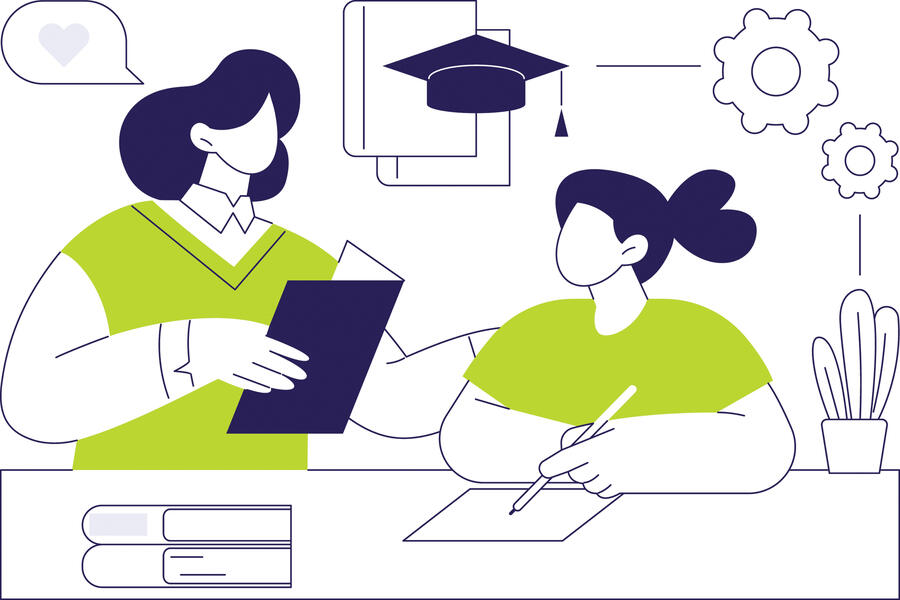When Angela R. Watson began to research homeschooling—specifically, which U.S. parents decide to educate their children outside of traditional school settings and why—she found that the topic was essentially a data void. This was back in 2019, when Watson had just earned her PhD in education policy—deciding, after initially getting a traditional teaching degree, that she could have a larger impact in the space through research. She had two young kids at the time, and "the rubber really meets the road when you start thinking about your own children's education," she says. "It was there I started becoming interested in how parents make choices about what kind of education they want to give their children."
She found herself building a discipline's foundation, brick by brick.
"No one was asking questions like how many of them are there, what they look like, what they're doing," Watson says of homeschooling families. "They're simple questions, but they're things no one has asked before."
The stereotypical image of homeschooling families has long been some flavor of Ballerina Farm, a popular TikTok channel chronicling a homeschooled family—primarily white, religious families with a distrust of the public education system. "That's all that really existed," Watson says of these prevalent assumptions. "I don't know if people even knew to question them."
Along came COVID lockdowns. Suddenly in early 2020, most every student was, to some degree, being homeschooled.
"Families got a look into the education of their kids in a way they never had before," Watson says, and "there were instances where they may not have liked what they saw." As the world rapidly transitioned online, it became crucial for parents and educators to understand what worked for students trying to learn in unprecedented circumstances.
Watson's work shows that homeschooling grew from about 2.8% to some 5.4% at the pandemic's onset; she suddenly found herself the foremost scholar of a topic that could not be elucidated fast enough.
"It has been like riding a wave. We started building the Homeschool Hub—it's an online catalog of all the data on homeschooling—and it just really took off like a rocket," she says. That led to the creation of the Homeschool Research Lab at the Johns Hopkins School of Education, which Watson directs. "I tell my collaborators that we're building this plane while we're flying it."
What she and colleagues have found topples traditional stereotypes about who homeschools their children today and why they decide to do so. Their research shows that the percentage of homeschooled children rose in the early days of the coronavirus pandemic, dipped slightly in the next two years, and then rose again even as overall school enrollment fell. As of now, findings cover only through the end of the 2023–24 school year because Trump administration cutbacks halted some of the federal data-gathering that underpins their analyses.
Additionally, homeschooling families are far more racially, geographically, and socioeconomically diverse than previously understood. For instance, Watson's research has found that since the pandemic spike in 2020, as many as 40% of homeschooled children are Black, Indigenous, and people of color.
"Something we work on is really trying to help inform these discussions with reliable evidence and facts instead of people having to resort to relying on stereotypes," she says.
The most common reason people cite for educating children at home, Watson says, is feeling unsafe in schools. While safety can mean a variety of things to different people, Watson notes that this speaks to the racism, gun violence, and bullying prevalent in public settings. Though the pandemic helped cause the rise in homeschooling families, concurrent events—such as the murder of George Floyd and the subsequent rise in prominence of the Black Lives Matter movement—impacted who felt unsafe in public, and why.
Separately, up to 40% of homeschooled children left conventional education because of special learning needs, she says, with siblings often continuing to study in traditional settings. Her work shows that students move in and out of homeschooling as their needs shift over time, aided by the increase in remote and hybrid jobs adding some degree of flexibility for working parents.
"Families are dynamic," Watson says. Homeschooling "impacts really large groups of the American population." Her work shows that more than a third of families with a homeschooled child have other kids in a conventional school setting.
That reality, she notes, means that education policies around homeschooling warrant updating. Many state rules and guidelines date to the original rise in homeschooling from the 1970s, spurred by actions in the '60s to desegregate and ban prayer in public schools.
"We have so many homeschoolers—they're so diverse—and our policies don't really align with actual practice we see across the country," Watson says, adding that she hopes that her ongoing work will help change this outdated status quo while fostering a pipeline of scholars committed to the field.
She also plans to continue growing the Homeschool Hub to become a source of original data to decrease her team's reliance on federal data collection while increasing its utility to other scholars.
"I thought, let's make lemonade out of that lemon," she says. "We're really trying to salvage this upcoming year and figure out what we can do."
Posted in Politics+Society
Tagged education








